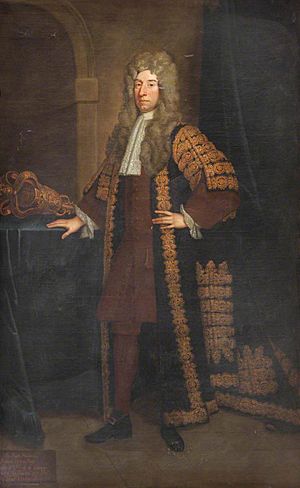Richard Onslow, 1st Baron Onslow facts for kids
Quick facts for kids
The Lord Onslow
|
|
|---|---|
 |
|
| Speaker of the House of Commons of Great Britain |
|
| In office 1708–1710 |
|
| Preceded by | John Smith |
| Succeeded by | William Bromley |
| Chancellor of the Exchequer | |
| In office 13 October 1714 – 12 October 1715 |
|
| Preceded by | William Wyndham |
| Succeeded by | Robert Walpole |
| Lord Commissioner of the Admiralty | |
| In office 5 June 1690 – 15 April 1693 |
|
| Lord Lieutenant of Surrey | |
| In office 1716–1717 |
|
| Preceded by | John Campbell |
| Succeeded by | Thomas Onslow |
| Personal details | |
| Born | 23 June 1654 |
| Died | 5 December 1717 (aged 63) |
| Political party | British Whig Party |
Richard Onslow (born June 23, 1654 – died December 5, 1717) was an important British politician. He was known as Sir Richard Onslow for many years. He belonged to the Whig Party, which was a major political group at the time.
Richard Onslow served in the British Parliament for a long time, from 1679 to 1715. He held two very important jobs: he was the Speaker of the House of Commons from 1708 to 1710, and the Chancellor of the Exchequer from 1714 to 1715. Some people found him difficult to work with. He was very strict about rules and principles. This earned him the nickname "Stiff Dick."
Contents
Early Life and Family
Richard Onslow was born in Surrey, England. His family was involved in politics. His father, Arthur Onslow, was a politician. His grandfather, Thomas Foote, had been the Lord Mayor of London in 1649.
Richard went to St Edmund Hall, Oxford in 1671. Later, he studied law at the Inner Temple. This prepared him for a career in public service.
Entering Parliament
Onslow became a Member of Parliament (MP) for Guildford in 1679. This was even before he officially became a lawyer. One of his first actions as an MP was to support the Exclusion Bill. This bill tried to stop James, Duke of York, who was Catholic, from becoming king. The bill was not successful.
He was re-elected to Parliament in 1685. From 1690 to 1693, he also served as a Lord of the Admiralty. This meant he helped manage the British navy.
Becoming Speaker of the House
Richard Onslow was very active in Parliament. He became known as a moderate Whig. In 1700, he was suggested for the job of Speaker. However, he did not win that time. A different candidate, Robert Harley, became Speaker instead.
Seven years later, in 1708, Onslow finally became Speaker. This was a very important role. The Speaker leads debates and keeps order in the House of Commons.
Challenges as Speaker
Onslow was not a very popular Speaker. He found it hard to be neutral, which is important for the Speaker's role. This upset many members of Parliament. His strictness about rules also made him unpopular.
A famous event during his time as Speaker was the trial of Dr. Henry Sacheverell. Onslow played a big part in this trial. When he took the House of Commons to hear the judgment, he argued about a small rule. This delayed the proceedings and made many people angry. Because of his unpopularity, he lost his seat in the 1710 election. He had to find a different, less important area to represent in Parliament.
Later Political Career
Four years later, in 1714, Onslow regained much of his political standing. He was again the MP for Surrey. When Queen Anne died in 1714, Onslow strongly supported a Protestant ruler to take the throne.
For his support, he was rewarded with a new job. He became the Chancellor of the Exchequer. This role is like being the country's chief financial officer. He held this position for about a year before he resigned. In 1716, he was given the title of Baron Onslow.
He also served as the Lord Lieutenant of Surrey from 1716 until his death in 1717. Richard Onslow was married to Elizabeth Tulse. They had two sons and two daughters. His son, Thomas, took over his title. His nephew, Arthur Onslow, also became a very long-serving Speaker of the House of Commons later on.
 | Jessica Watkins |
 | Robert Henry Lawrence Jr. |
 | Mae Jemison |
 | Sian Proctor |
 | Guion Bluford |

